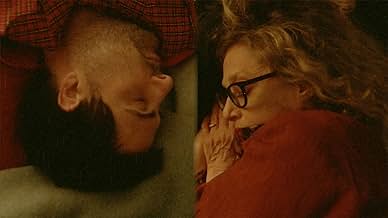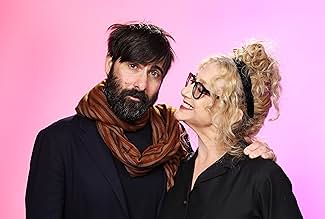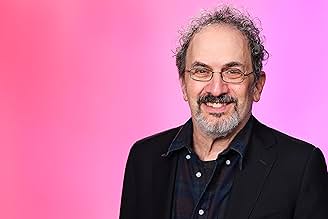A cantor in a crisis of faith finds his world turned upside down when his grade school music teacher re-enters his life as his new adult Bat Mitzvah student.A cantor in a crisis of faith finds his world turned upside down when his grade school music teacher re-enters his life as his new adult Bat Mitzvah student.A cantor in a crisis of faith finds his world turned upside down when his grade school music teacher re-enters his life as his new adult Bat Mitzvah student.
- Director
- Writers
- Stars
- Awards
- 4 wins & 10 nominations total
- Director
- Writers
- All cast & crew
- Production, box office & more at IMDbPro
Featured reviews
I was not Bat Mitzvahed, but had the opportunity to learn to read Torah at the age of 50. As soon as I saw a review of this film, I knew that I had to see it. I thoroughly enjoyed myself and was moved on a very personal level.
The performances were superb, the script was sharp and funny. Most of the details were spot-on, many of them recalling my own and my family's experiences. That said, I can understand why viewers who are less familiar with Jewish ritual and culture might be left cold by the film.
Coming to Torah later in life, I, of course, related strongly to Carla's character. The one glaring flaw I felt was the absence of a Torah scroll in film. Reading from the scroll, copied and produced exactly as it had been for milennia, was an overwhelming part of the experience for me. It gave me a connection to ritual and history that I'd never experienced before.
The performances were superb, the script was sharp and funny. Most of the details were spot-on, many of them recalling my own and my family's experiences. That said, I can understand why viewers who are less familiar with Jewish ritual and culture might be left cold by the film.
Coming to Torah later in life, I, of course, related strongly to Carla's character. The one glaring flaw I felt was the absence of a Torah scroll in film. Reading from the scroll, copied and produced exactly as it had been for milennia, was an overwhelming part of the experience for me. It gave me a connection to ritual and history that I'd never experienced before.
I loved Between the Temples. Not so much for the slightly predictable plot -- twenty minutes in, you get no prizes for guessing where the story is going -- but for the fresh, improvisational camerawork, for the observations, the attention to the sheer physicality and texture of reality, of bodies, of objects. Some sequences are almost Vertovian: the one where the protagonist watches the video of his younger self, in particular: its tempo is so precise, so funny and poetic, it made me want to applaud.
The references to the cinema of the 70s are so pointed that it occasionally borders on the pastiche; it wasn't before the appearance of the first modern car that I became sure I wasn't watching the reedition of a forgotten vintage indie movie. But, heck, it works, in spite of its occasional weaknesses it's fun, fun, fun.
The references to the cinema of the 70s are so pointed that it occasionally borders on the pastiche; it wasn't before the appearance of the first modern car that I became sure I wasn't watching the reedition of a forgotten vintage indie movie. But, heck, it works, in spite of its occasional weaknesses it's fun, fun, fun.
Nathan Silver's "Between the Temples" is widely acclaimed by critics. Your experience may vary. Mine did.
Following the accidental death of his wife, Ben (Jason Schwartzman - "Asteroid City" and other Wes Anderson projects) is bereft. Although he works as the cantor for a local synagogue, he is unable to sing. After his latest failed attempt during services, Ben rushes out of the synagogue. He lies down in the middle of the road to end it all but instead gets a lift from the truck driver to a nearby bar. He gets drunk. In a related matter, he gets punched in the face. In the process, he becomes reacquainted with his childhood music teacher, Carla (a fantastic Carol Kane). Eventually, Ben begins to tutor the 70ish Carla for the bat mitzvah denied her by her Russian Communist parents.
Silver uses this story, which begins with tremendous potential, to explore the themes of many of his previous films, particularly the paralyzing consequences of anxiety and fear and why people fall in love or even put up with each other. At the same time, he offers a gentle critique of Jewish culture that features an explosive Shabbat dinner, mothers (Ben has two) fixated on immediately finding him a nice Jewish girl and a rabbi who's willing to negotiate and haggle about everything. Robert Smigel as the rabbi and Madeline Weinstein as Gabby, the rabbi's daughter and very available Jewish girl, offer strong performances.
The oddball relationship between Ben and Carla is mesmerizing. It's sweet, kind, confusing, funny, quirky and completely charming. Schwartzman and Kane's performances are well worth the price of admission.
What sunk this film - and it's a sinking of Titanic proportions in my view - is the muddled tone. On the one hand, there's a pervasive sweetness and a kindness in the face of everyone's frailties that's quite endearing. This sweetness encourages, even compels, the moviegoer to really invest in what's happening with these characters. So it's jarring to have slapstick scenes injected into the story along with diversions into broad, bawdy, absurdist comedy that shove us away from the feelings being so carefully nurtured. At times, I felt manipulated by these jolting shifts in tone and perspective. For me, this tonal inconsistency was a deal-breaker. Even the title of this film can't seem to make up its mind. Is the film to be an assessment of Jewish culture? Is it to be a treatise on behavioral neuropsychology? Or is it just trying to be too clever for its own good?
"Between the Temples" is a step forward from Silver's very low-budget previous films, many of which starred his mother. It's thoughtful, sometimes insightful and occasionally hilarious. Unfortunately, it's a film that never decides whether it wants to be sweet and earnest or "Harold and Maude." I left the theater feeling confused by an unfocused story (and an incomprehensible conclusion) that felt more lazy than layered.
Following the accidental death of his wife, Ben (Jason Schwartzman - "Asteroid City" and other Wes Anderson projects) is bereft. Although he works as the cantor for a local synagogue, he is unable to sing. After his latest failed attempt during services, Ben rushes out of the synagogue. He lies down in the middle of the road to end it all but instead gets a lift from the truck driver to a nearby bar. He gets drunk. In a related matter, he gets punched in the face. In the process, he becomes reacquainted with his childhood music teacher, Carla (a fantastic Carol Kane). Eventually, Ben begins to tutor the 70ish Carla for the bat mitzvah denied her by her Russian Communist parents.
Silver uses this story, which begins with tremendous potential, to explore the themes of many of his previous films, particularly the paralyzing consequences of anxiety and fear and why people fall in love or even put up with each other. At the same time, he offers a gentle critique of Jewish culture that features an explosive Shabbat dinner, mothers (Ben has two) fixated on immediately finding him a nice Jewish girl and a rabbi who's willing to negotiate and haggle about everything. Robert Smigel as the rabbi and Madeline Weinstein as Gabby, the rabbi's daughter and very available Jewish girl, offer strong performances.
The oddball relationship between Ben and Carla is mesmerizing. It's sweet, kind, confusing, funny, quirky and completely charming. Schwartzman and Kane's performances are well worth the price of admission.
What sunk this film - and it's a sinking of Titanic proportions in my view - is the muddled tone. On the one hand, there's a pervasive sweetness and a kindness in the face of everyone's frailties that's quite endearing. This sweetness encourages, even compels, the moviegoer to really invest in what's happening with these characters. So it's jarring to have slapstick scenes injected into the story along with diversions into broad, bawdy, absurdist comedy that shove us away from the feelings being so carefully nurtured. At times, I felt manipulated by these jolting shifts in tone and perspective. For me, this tonal inconsistency was a deal-breaker. Even the title of this film can't seem to make up its mind. Is the film to be an assessment of Jewish culture? Is it to be a treatise on behavioral neuropsychology? Or is it just trying to be too clever for its own good?
"Between the Temples" is a step forward from Silver's very low-budget previous films, many of which starred his mother. It's thoughtful, sometimes insightful and occasionally hilarious. Unfortunately, it's a film that never decides whether it wants to be sweet and earnest or "Harold and Maude." I left the theater feeling confused by an unfocused story (and an incomprehensible conclusion) that felt more lazy than layered.
"I taught you. Now you teach me." Carla (Carol Kane)
Between the Temples taught me more about Jewish culture than any other film in recent memory. And it's not nerdy stuff: it's about Cantor Ben (Jason Schwartzman), whose gentile music teacher, Carla, requests Bat Mitsvah for herself even though she's hardly 13 years old. When she was that age, she was not allowed the 13-month preparation due to her parents being communists.
Although Temples is ostensibly a comedy, for which its screwball dialogue is a testament, it is really about different cultures adjusting to the changes that outsiders eventually bring. Having lost his wife to a freak accident a year ago, Ben is understandably distracted until Carla re-enters his life bringing romance and a host of cultural cliches, like a pushy mother trying to arrange a marriage for him. See the Shabbat dinner for the full explosion of cultural imperatives couched in comedic form.
Adding to his tension is Gabby (Madeline Weinstein), visiting daughter of Ben's Rabbi Bruce (Robert Smigel), who offers kinky sex and Ben's Mother's approval. Weinstein is an at-ease actress easy on her emotions and her look to promise a grand future.
Between the Temples has a breezy, comfortable way about dealing with the challenges so that it makes The Graduate, with its Protestant expectations for Benjamin (Dustin Hoffman) look unassuming, and Benjamin's affair with Mrs. Robinson (Anne Bancroft) negligible.
Director/writer Nathan Silver and co-writer C. Mason Wells a keep the jokes coming, e.g., the biggest menu of any restaurant scene in the history of film and Ben saying even his name is in the past. The film shows how much pain change can bring while it also delivers a whole lot of love. Pursuing your own likes makes its way to the head of the class for happiness, age and cultural differences be damned.
Schwartzman has never been better as the vulnerable Jew, and Carol Kane has never been as attractive, regardless of her age. Heck, look at 19-year-old Harold and 80-year-old Maude; thank you Hal Ashby and Cat Stevens.
Between the Temples taught me more about Jewish culture than any other film in recent memory. And it's not nerdy stuff: it's about Cantor Ben (Jason Schwartzman), whose gentile music teacher, Carla, requests Bat Mitsvah for herself even though she's hardly 13 years old. When she was that age, she was not allowed the 13-month preparation due to her parents being communists.
Although Temples is ostensibly a comedy, for which its screwball dialogue is a testament, it is really about different cultures adjusting to the changes that outsiders eventually bring. Having lost his wife to a freak accident a year ago, Ben is understandably distracted until Carla re-enters his life bringing romance and a host of cultural cliches, like a pushy mother trying to arrange a marriage for him. See the Shabbat dinner for the full explosion of cultural imperatives couched in comedic form.
Adding to his tension is Gabby (Madeline Weinstein), visiting daughter of Ben's Rabbi Bruce (Robert Smigel), who offers kinky sex and Ben's Mother's approval. Weinstein is an at-ease actress easy on her emotions and her look to promise a grand future.
Between the Temples has a breezy, comfortable way about dealing with the challenges so that it makes The Graduate, with its Protestant expectations for Benjamin (Dustin Hoffman) look unassuming, and Benjamin's affair with Mrs. Robinson (Anne Bancroft) negligible.
Director/writer Nathan Silver and co-writer C. Mason Wells a keep the jokes coming, e.g., the biggest menu of any restaurant scene in the history of film and Ben saying even his name is in the past. The film shows how much pain change can bring while it also delivers a whole lot of love. Pursuing your own likes makes its way to the head of the class for happiness, age and cultural differences be damned.
Schwartzman has never been better as the vulnerable Jew, and Carol Kane has never been as attractive, regardless of her age. Heck, look at 19-year-old Harold and 80-year-old Maude; thank you Hal Ashby and Cat Stevens.
Between the Temples is a 2024 "comedy" directed by Nathan Silver. "Comedy" in quotations because this is really not a 'haha' comedy life American audiences are used to, but a drama with a universal lens of levity and funny *life* moments. There really aren't many examples of this genre in western media, but in many eastern movies and TV shows, this would easily slot into the genre called "Slice of Life". There are so few that the only one that I can think of off the top of my head is the masterpiece novel Cannery Row by John Steinbeck. Undoubtably, this was made with much love and many winks for Jewish audiences, as the punctuated laughter throughout my viewing showed, but underneath that is a very pure, human, down to earth story about the healing power of human connection.
For starters, the dialogue and especially the layered dialogue performances by all the characters throughout the film are so real, it's uncanny at times. We can't help at laugh and cringe at awkward dinner scenes that are so like the ones many of us have been apart of in our lives. The script is tight, and the story flows beautifully, although it might not be clear until the end where the story is going. This is something that is just going to be inherent to the genre because, like life, it's not clear what the story arc is until it's over. The film is also very timeless, as it's based around a small community and makes very infrequent use of technology or modern plot devices. It could as easily have been made in 1980 as in 2024. I have some gripes about the photography of the film, but its undeniable that there is a cozy and timeless feel to the whole movie. Solid acting jobs all around by the entire cast. I'm not sure that anyone particularly stood out beyond the great dialogue writing, but everyone played their part well. In this absolutely charming, down to earth story about human connection, the most stunning moments are often the most mundane -- just moments when the two leads are in on room together, riffing back and forth.
As you can tell, I'm exceptionally charmed by this film, but there are a couple negative things I can note. For one, the choice to use a very dated 90s digital photography setup didn't do much for me. The picture was very noisy, and I'm not sure that any of the film's great qualities would be taken away if a modern 2024 digital photography setup was used. Another thing is that the film is very Jew-centric and therefore non Jewish audiences will inevitably miss a lot of jokes. I knew there were quite a few camera gags that I didn't understand, but the Jewish audience members were howling at. Nonetheless, I still think the underlying film is great. A few genre-specific points as well: it's not quite clear for much of the film as to where the film is going, or even how long the timeline of the film is. Silver does a decent job at re-grounding the audience periodically as to what is happening when, but it can still be a bit confusing due to the way the film is edited. The film purports to be over the course of 3ish weeks, but it could easily have been over the course of a few months. A minor gripe, but still.
As the gap between critical acclaim for this film and audience despair widens, I have to say that I think this is a case of the media not being to the western audience's tastes. That's totally understandable, so if a cozy and somewhat funny human interest story appeals to you, then please please please give Between the Temples a watch!
For starters, the dialogue and especially the layered dialogue performances by all the characters throughout the film are so real, it's uncanny at times. We can't help at laugh and cringe at awkward dinner scenes that are so like the ones many of us have been apart of in our lives. The script is tight, and the story flows beautifully, although it might not be clear until the end where the story is going. This is something that is just going to be inherent to the genre because, like life, it's not clear what the story arc is until it's over. The film is also very timeless, as it's based around a small community and makes very infrequent use of technology or modern plot devices. It could as easily have been made in 1980 as in 2024. I have some gripes about the photography of the film, but its undeniable that there is a cozy and timeless feel to the whole movie. Solid acting jobs all around by the entire cast. I'm not sure that anyone particularly stood out beyond the great dialogue writing, but everyone played their part well. In this absolutely charming, down to earth story about human connection, the most stunning moments are often the most mundane -- just moments when the two leads are in on room together, riffing back and forth.
As you can tell, I'm exceptionally charmed by this film, but there are a couple negative things I can note. For one, the choice to use a very dated 90s digital photography setup didn't do much for me. The picture was very noisy, and I'm not sure that any of the film's great qualities would be taken away if a modern 2024 digital photography setup was used. Another thing is that the film is very Jew-centric and therefore non Jewish audiences will inevitably miss a lot of jokes. I knew there were quite a few camera gags that I didn't understand, but the Jewish audience members were howling at. Nonetheless, I still think the underlying film is great. A few genre-specific points as well: it's not quite clear for much of the film as to where the film is going, or even how long the timeline of the film is. Silver does a decent job at re-grounding the audience periodically as to what is happening when, but it can still be a bit confusing due to the way the film is edited. The film purports to be over the course of 3ish weeks, but it could easily have been over the course of a few months. A minor gripe, but still.
As the gap between critical acclaim for this film and audience despair widens, I have to say that I think this is a case of the media not being to the western audience's tastes. That's totally understandable, so if a cozy and somewhat funny human interest story appeals to you, then please please please give Between the Temples a watch!
Did you know
- TriviaThe rabbi has a personalized license plate that says TKNOLUM. This refers to the Hebrew phrase "Tikkun Olam" meaning "Repair the World".
- GoofsWhile being picked on at the bar, Benny finishes his mudslide and noisily places the empty glass on the bar. As seen from the big guy's point of view, the mudslide in front of Benny is hall full.
- Quotes
Rabbi Bruce: Anyone is entitled to love anyone, but not while pretending and giving other people the impression that he loves someone else.
- ConnectionsReferences The Philadelphia Story (1940)
- SoundtracksKol Ehad
Performed by Mordecai Arnon (as Pupik Arnon)
Written by Miki Gabrielov and Mordecai Arnon (as Mordechai 'Pupik' Arnon)
Courtesy of Phonokol Record Company
- How long is Between the Temples?Powered by Alexa
Details
- Release date
- Country of origin
- Language
- Also known as
- 聖殿領唱的幸福指南
- Filming locations
- Production companies
- See more company credits at IMDbPro
Box office
- Gross US & Canada
- $2,084,122
- Opening weekend US & Canada
- $647,757
- Aug 25, 2024
- Gross worldwide
- $2,316,693
- Runtime1 hour 51 minutes
- Color
Contribute to this page
Suggest an edit or add missing content





































